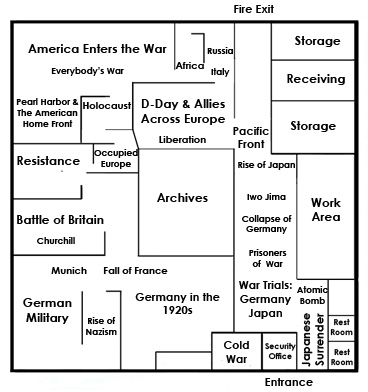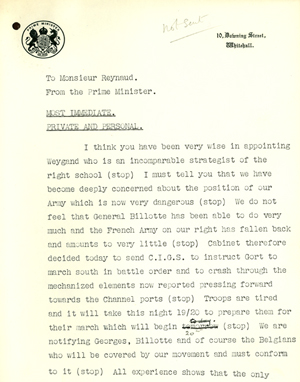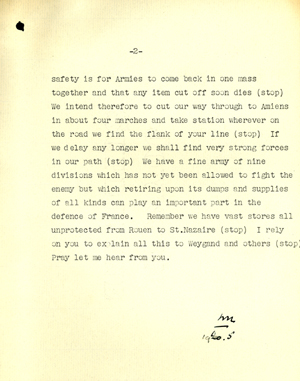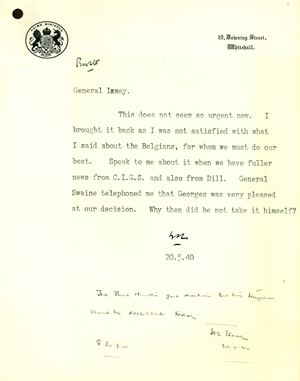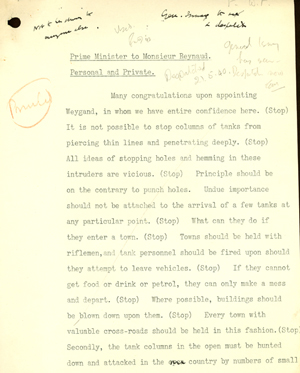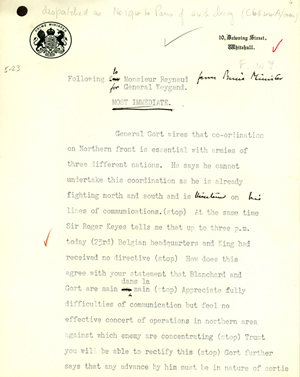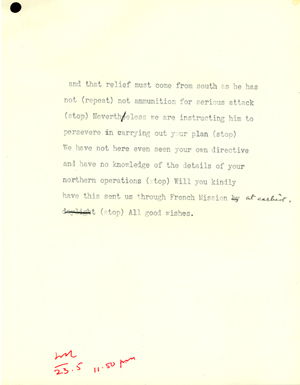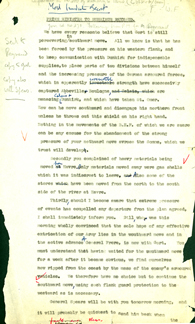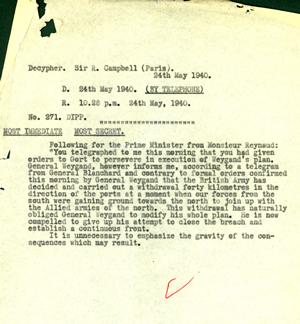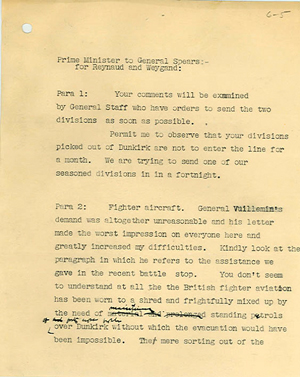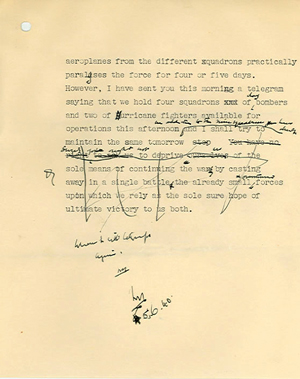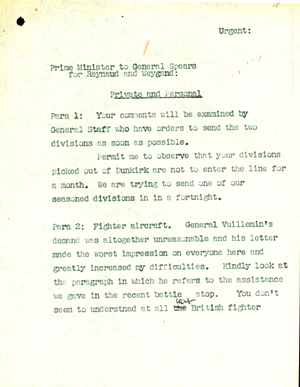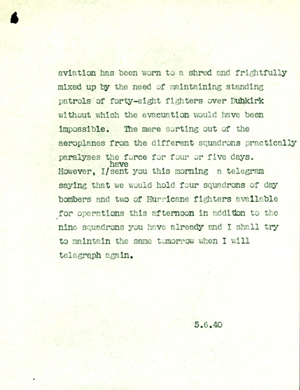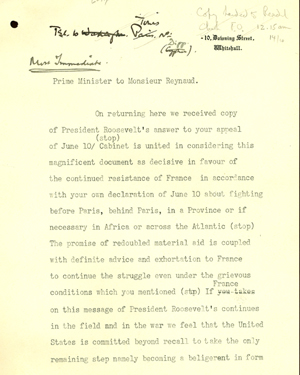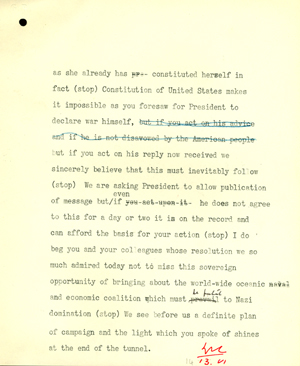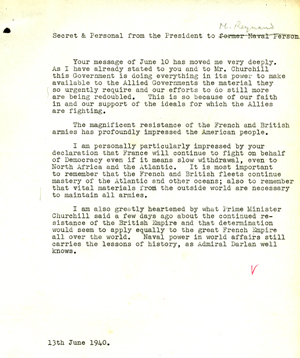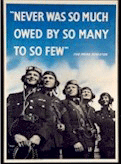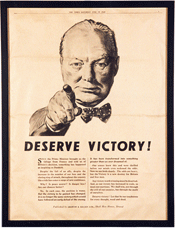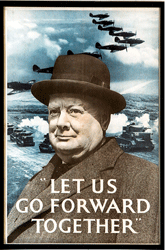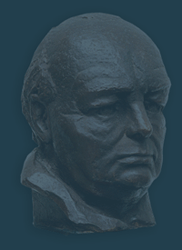 |
The wartime Prime Minister of England might be the most highly regarded leader of recent centuries. The Museum's collection of Churchill artifacts includes his famous 'Siren Suit', which he used for work and recreation; manuscripts of speeches; personal letters; and artifacts that were uniquely Churchill-- his cigar case, his coffee spoons and a large landscape oil painting. |
|
| |
| This wartime oil portrait of Churchill was hung at the R.A.F. Officer's Mess at Barnby Moor in Yorkshire, England. |
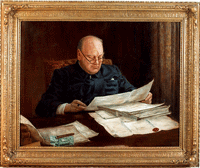 |
|
| |
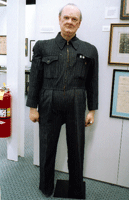 Winston Churchill wearing his wartime 'Siren Suit'. Churchill designed his trademark suit to enable him to retain a measure of comfort without forfeiting his formal authority when working long hours. The small flecks of red on the front are from times that he was painting, one of his favorite pastimes. Winston Churchill wearing his wartime 'Siren Suit'. Churchill designed his trademark suit to enable him to retain a measure of comfort without forfeiting his formal authority when working long hours. The small flecks of red on the front are from times that he was painting, one of his favorite pastimes. |
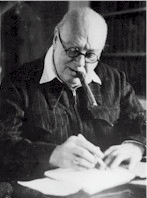 Photo of Churchill, at work in his Siren Suit. Photo of Churchill, at work in his Siren Suit. |
|
| |
Winston Churchill's personal files of his letters and messages directing the Battle of France in May and June 1940 is one of the Most exciting and extraordinary archives in the museum. The sampling of letters shown here are all written to the President of France, Paul Reynaud, all bear notations, and are signed by him with initials. This archive represents an extraordinary view into the day by day, and in many cases hour by hour, Churchill's personal direction of the Battle of France.
All of the handwriting is that of Winston Churchill. He has signed most of the pieces with his initials "WSC" and the date, and in some cases the time. |
|
| |
|
| |
|
| |
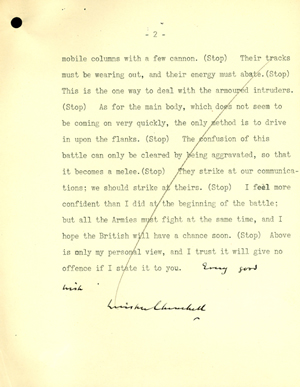 |
>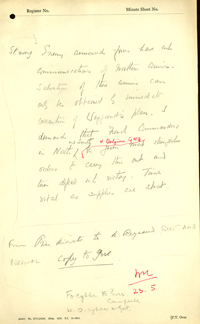 |
|
| |
|
| |
|
| |
Winston Churchill's annotated draft of his message to French President, Paul Reynaud, June 5, 1940, the day after 338,226 troops were evacuated from Dunkirk. This same day German Panzers began their direct attack on Paris: it fell nine days later, and France surrendered June 22nd.
Churchill's bluntness in his draft was tempered in his corrected version: "You have no right to ask us to deprive ourselves of the sole means of continuing the war by casting away in a single battle the already small forces upon which we rely as the sole sure hope of ultimate victory to us both."
All of the notations and corrections are in Churchill's hand; his initials and date are at the conclusion. The carbon typescript with one correction by him is the message sent to Reynaud. |
|
| |
|
| |
|
| |
|
| |
|
| |
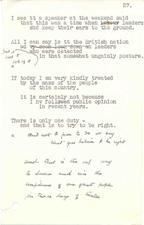 |
Working draft of Churchill's speech in the House of Commons, Sept. 30, 1941, concerning the Japanese offensive into China. |
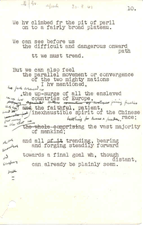 |
|
| |
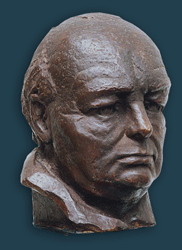 |
1943 bust of Churchill by Clare Sheridan. |
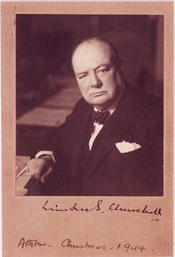 |
Churchill, autograph picture, Christmas 1944 |
|
| |
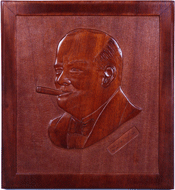 |
Signed wood carving of Churchill by S.Q.M.S. Bourne, a member of the staff of the Royal Tank Regiment at Dorset. |
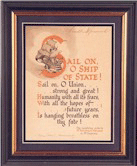 |
"SAIL ON, O SHIP OF STATE!"
by Henry Wadsworth Longfellow, was written out by Franklin D. Roosevelt in a letter to Churchill, who, in turn, had this broadside made. A copy was obtained by Roosevelt's personal envoy to Britain, Harry Hopkins, who asked FDR and the Prime Minister to sign it when they met for the Atlantic Charter.
Roosevelt had copied the stanza of Longfellow from memory for Churchill on Jan. 19, 1941, the day before his third inauguration, and forwarded it with a personal letter addressed to "a certain Naval person" In that letter, Roosevelt explained his conviction that "this verse applies to you people as well as to us." |
|
| |
| Churchill inscribed the lid of a tobacco jar of stone from the section of the House of Commons which was destroyed by incendiary bombs in 1941. |
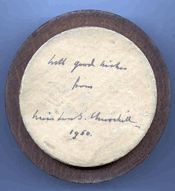 |
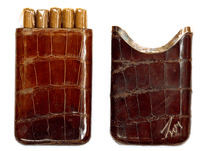 |
Winston Churchill's crocodile-skin cigar case, made by Asprey, 1923, with Churchill's holographic-style initials. |
|
| |
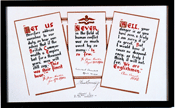 |
Poster with memorable Churchill quotes, autographed by Churchill and Czech President Edouard Benes. |
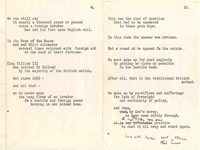 |
Winston Churchill's manuscript for a speech, with his corrections, discussing the Battle of Britain: "We can still say [that] nearly a thousand years [have] passed since a foreign invader has set his foot upon English soil....since 1066....we [have] never seen the camp fires of an invader [from] a hostile and foreign power burning in our island home..." |
|
| |
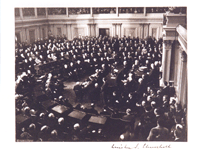 |
Photo of Churchill addressing the U.S. Congress, Dec. 26, 1941. |
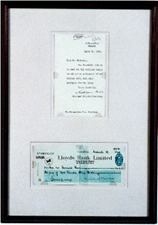 |
A check from Churchill to Averill Harriman, August 23, 1943, for 5 pounds 3 shillings, "in settlement of his bezique debt." 6-deck bezique, a forerunner of the card game pinochle, was reputed to be one of Churchill's favorites. |
|
| |
|
| |
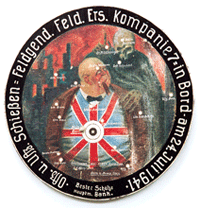 |
German propaganda target painted with Churchill as the bulls-eye and burning London in the background and the figure of death looking over his shoulder. |
|


